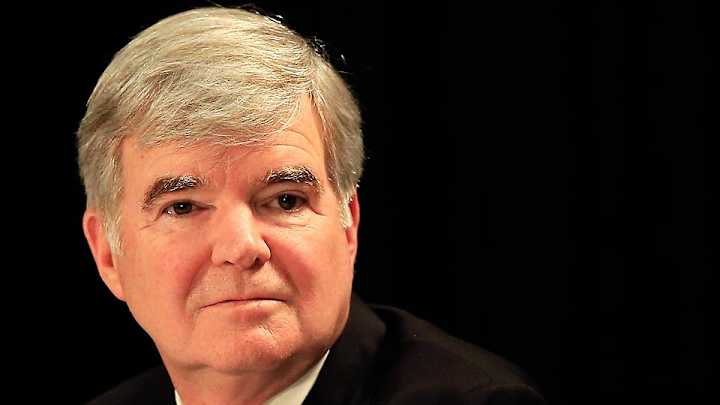NCAA president Mark Emmert talks O'Bannon case on ABC's 'This Week'

On Sunday, NCAA President Mark Emmert said that despite the NCAA's loss in a high-profile antitrust case this week, the ruling actually shows the organization is on the right path towards providing benefits for student-athletes.
U.S. Circuit Judge Claudia Wilken ruled on Friday that the NCAA violated antitrust law by preventing student-athletes from being compensated for their name, image and likeness (NIL) rights. The issue was the central point in a major lawsuit brought against the NCAA by former UCLA basketball player Ed O'Bannon and a number of current and former student-athletes. Wilken's ruling allows for student-athletes to share in licensing revenue in the form of trust funds to be payable after their eligibility expires.
What Ed O'Bannon's victory over the NCAA means moving forward
In his first public comments since the O'Bannon ruling, Emmert appeared on ABC's "This Week" alongside University of South Carolina President Harris Pastides and maintained the position that the NCAA does not violate antitrust law in its treatment of student-athletes. Meanwhile, Emmert said Wilken's decision could have negative ripple effects throughout college sports.
"Well, I think it potentially could," Emmert told "This Week" host Martha Raddatz. "There's a lot in the ruling that I think is admirable and that's consistent with arguments that we've been making all along. And there are some things about it that we really fundamentally disagree with, most notably, we disagree that there's a violation of anti-trust laws going on here. And we'll probably continue to argue that in the coming months and beyond. But it has the potential to fundamentally shift intercollegiate athletics in ways that many people are concerned about."
Emmert said it's difficult to fully argue that O'Bannon and student-athletes like him are professionals.
"It's a decision that Mr. O'Bannon made when he was a student, right?," Emmert said. "He had every opportunity to do as much as he wanted in school as he desired. He got a degree from the university and many, many, many thousands of student athletes take full advantage of the opportunity to be both a student and an athlete while they're in college. And the vast majority of them graduate. More graduate than the students who aren't student athletes. So I believe strongly, and, more importantly, the evidence demonstrates that, indeed, they are students."
Prior to Wilken's decision on Friday, the NCAA's Division I Board of Directors voted to pass legislative autonomy for the so-called "Power Five" conferences, the ACC, Big Ten, Big 12, Pac-12 and SEC. Autonomy would allow for those major programs to pass legislation for increased benefits for student-athletes, such as cost-of-attendance and increased health benefits.
NCAA loses in O'Bannon case, but hope for the association remains
"This is a topic that's been under debate and discussion for more than three years, about how to reach full cost of attendance, how to provide student athletes more support," Emmert said on Sunday. "There's very little doubt and debate about the need to do that. And I and Dr. Pastides and many others have been advocating it for years. And I think this move will finally allow us to get there."
Raddatz asked Emmert if the Power Five's autonomy will only increase the arms race that takes place atop major college football.
"I don’t know," Emmert said. "We’ll have to wait and see."
As expected, the NCAA announced on Sunday that it would appeal Wilken's ruling. Asked by Raddatz to confirm the NCAA's decision to appeal, Emmert said, "Yes, at least, in part, we will."
Emmert and the NCAA's legal team will be fighting an uphill battle with their rhetoric surrounding amateurism. Several legal challenges remain for the NCAA, including one brought by high-profile attorney Jeffrey Kessler, whose lawsuit against the NCAA and the Power Five conferences seeks to essentially destroy amateurism as it is currently defined. Proving amateurism as a necessary component to the academic side of college sports is a wonderful talking point on Sunday morning television, but as Wilken's decision this week proved, arguing those points in a court of law is another situation entirely.

Zac Ellis joined SI.com in 2011 and has covered college football and basketball since 2012. In addition to features and columns, he is SI’s primary Heisman Trophy analyst.